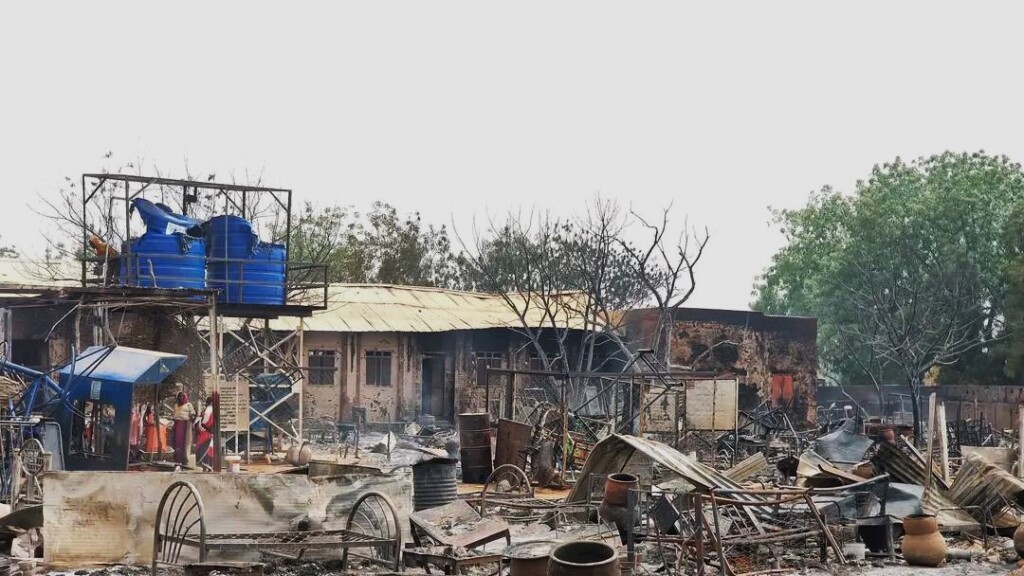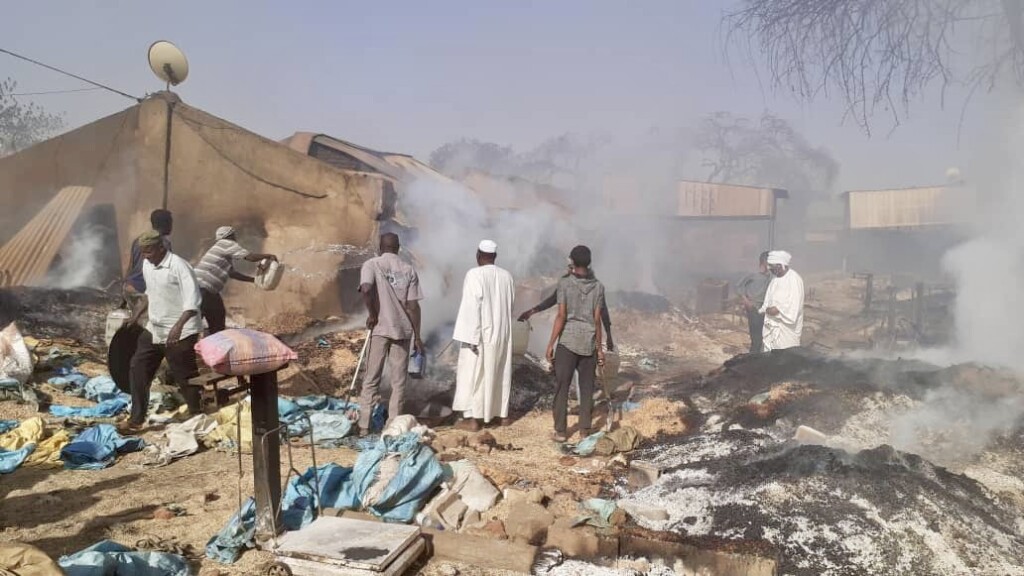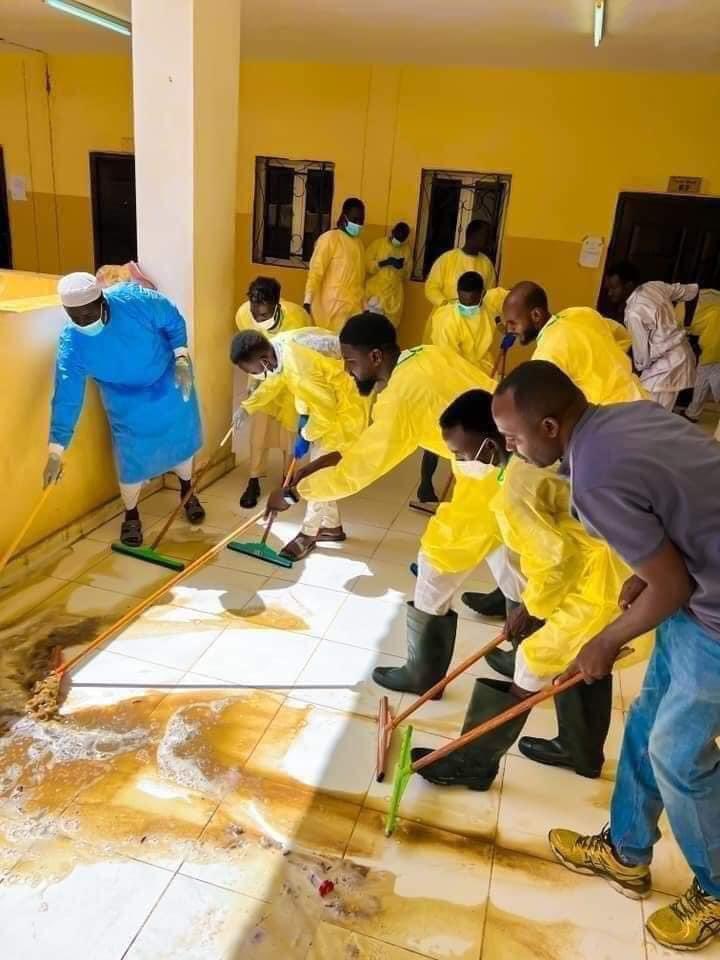Darfur update: El Geneina clashes continue, truce holds in El Fasher, looting in Nyala

Destruction in El Geneina in April. The situation has only deteriorated since (social media)
EL GENEINA / EL FASHER / NYALA – May 2, 2023
Attacks are still taking place in West Darfur capital El Geneina, where the number of dead has risen to at least 230. Those left behind in the city are facing an ‘extremely bad’ humanitarian situation. In North Darfur capital El Fasher, a civilian-brokered truce is holding. The Ministry of Education in South Darfur was looted.
A temporary health centre set up in the city recorded at least 230 dead and 350 wounded, more than 60 of whom need urgent surgical intervention.
Lawyer Abdelmonim Adam told Radio Dabanga that the situation is extremely dire. “Attacks by forces stationed in the southwest of the city are still ongoing.”
He reported “a complete collapse of the health system in the city” where residents also experience a severe lack of food, electricity and drinking water.
The Sudan Doctors Union reported that all hospitals and health facilities in El Geneina were forced to close.
“The El Geneina Teaching Hospital, the El Sultan, El Rahma Complex, and El Shakreen medical complexes as well as most health centres are completely out of service, while more than 60 wounded need an urgent operation,” Adam said.
“We cannot find any medicine anymore after pharmacies, hospitals, health centres, and markets have been plundered.”
‘We cannot find any medicine anymore after pharmacies, hospitals, health centres, and markets have been plundered’
There are still corpses lying in the streets, although the Red Crescent Society collected a number of bodies on Saturday. “They were buried at the Neem cemetery.”
Sudanese news outlet Ayin also reported that volunteers from the Red Crescent Society attempted to collect corpses from the street on Friday but were fired at by unknown gunmen and had to stop their operations after collecting 13 bodies.
The actual death toll of the clashes is hard to estimate and might be much harder as not all bodies can be accessed. Yesterday, the Assistant Commissioner for Refugees in Darfur told Radio Dabanga that hundreds of dead and wounded were not counted.

Humanitarian situation
Adam also reported that the humanitarian conditions experienced by the many people that sought refuge in the northern neighbourhoods of the city are extremely bad, with men sleeping on the ground in the streets and women and children sheltering inside homes.
He appealed to the aid organisations and the international community to intervene urgently to stop the attacks and to provide first aid to the wounded and food and medicine to the people.
Sultan Saad Bahreldin, the sultan of the Masalit tribe, told Radio Dabanga that the shooting is continuing and that the humanitarian conditions are very bad as all the displaced sleeping rough and lack food and water.
Banks and institutions were completely looted. The markets in the city are still witnessing the ongoing looting without the intervention of any party to prevent the plundering, the sultan reported.
Native administration meeting
Masalit native administration* leaders held a meeting yesterday in an attempt to defuse the crisis in El Geneina.
Sultan Bahreldin said that the meeting aimed to discuss ways to stop the violence and address the humanitarian situation.
He stressed the need for the intervention of native administration leaders to defuse the crisis because authorities are absent. “No security forces have intervened so far.”
‘No security forces have intervened so far’
El Fasher truce successful
The ceasefire in El Fasher, North Darfur, which was brokered by tribal leaders on April 20 and extended for an indefinite period of time three days later is still holding.
All health facilities have been re-opened with the help of young activists and Sudanese NGOs working in the humanitarian field.

Last week, the president of Médecins Sans Frontières (MSF) said that the organisation is still working El Fasher: “A hospital we support in El Fasher continues to receive wounded people and a surgical team is doing back-to-back surgeries. Staff are exhausted”.
Though the security situation in the city is calm, residents report a complete power outage for the past four days and say that fuel and bread are extremely scarce.
They told Radio Dabanga that the price of a gallon of petrol jumped from SDG3,000 to about SDG25,000 on the black market.
“The scarcity bread can be attributed to the lack of flour,” Khadija Yagoub said. “The lines in front of bakeries still open are getting longer and longer.” She reported a lack of all basic commodities, especially water and food.
‘The lines in front of bakeries still open are getting longer and longer’
Taxi driver Saddam Ismail said that he has been queuing for fuel since Sunday despite the pump being closed, hoping that it would open soon. “Most of the transport vehicles in the city can now be found queuing at the pump stations.”
Queues for petrol stations and bakeries have been reported in other Sudanese cities too.
Nyala looting
In Nyala, the South Darfur Ministry of Education said that nine of its vehicles were stolen during clashes between the army and the RSF in the city over the weekend.
Omar El Tom, acting director of the ministry, also reported “the complete destruction of the information centre” yesterday morning. Refrigerators, water coolers, television screens, photocopiers, and devices were stolen.
The ministry’s offices containing press machines for printing textbooks and exams and the bookstore were burned to the ground.
Nyala has witnessed significant looting since clashes between the RSF and SAF started. Local residents have formed popular initiatives to secure their neighbourhoods, including barricading the streets.
* The Native Administration was instituted by British colonial authorities seeking a pragmatic system of governance that allowed for effective control with limited investment and oversight by the state. According to the Darfur Bar Association (DBA), the Native Administration during the 30-year rule of dictator Omar Al Bashir did not represent the real local leaders and accused them of corruption.






 and then
and then